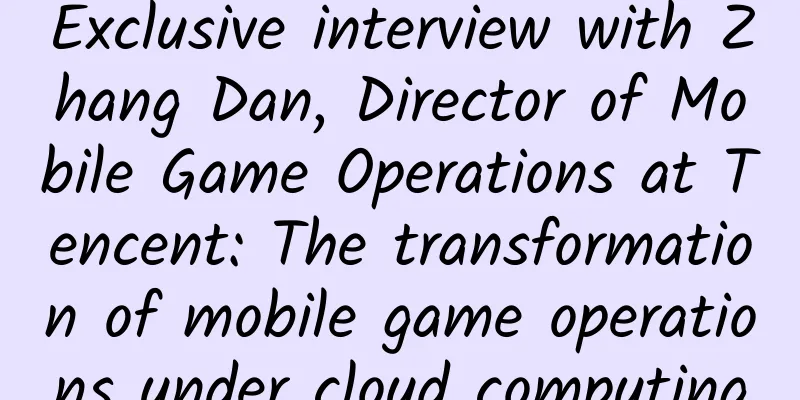Exclusive interview with Zhang Dan, Director of Mobile Game Operations at Tencent: The transformation of mobile game operations under cloud computing

|
Zhang Dan, Director of Tencent Interactive Entertainment Operation Department, is mainly responsible for mobile game operations in Tencent Game Operation Department. He has ten years of experience in the development and operation of wireless Internet. His work experience ranges from SMS games, WAP games, stand-alone games, K-JAVA games, to current smartphone games. He is currently the technical leader of Tencent Mobile Game Open Platform, Tencent Mobile Game Platform and Tencent Mobile Game SDK.
Currently, it takes only one or two weeks to prepare the operating environment for mobile games , which is a huge challenge." In the face of the rapid development of cloud computing and mobile Internet, Zhang Dan believes that this is a huge challenge for mobile games, but also an opportunity. The reporter also noticed that from the current trend, WeChat is definitely a platform that many mobile game companies yearn for. Through sharing and invitations in Moments, this kind of "viral" marketing, various mobile game companies influence and compete with each other, and new operations are in urgent need of change. Tencent games are extremely popular on the mobile Internet. Can you talk about its current scale?Zhang Dan: Tencent has been developing PC games for more than a decade, with a total user base of about 250 million and web games of about 80 million. The boom started in August last year when we launched our first game, “Love Elimination”. Tencent Mobile Games has already reached 600-700 million independent users, which has great potential compared to PC games and web games. Looking at the scale of the number of games, Tencent Games is mainly divided into two platforms: one is the boutique platform, which is mainly our mobile QQ and WeChat game center. The other is the large application treasure platform, including application treasure, QQ browser, mobile manager, QQ space and other applications with relatively large traffic, which they will also distribute. Currently, there are more than 30 games on Tencent boutique game platform. In the future, our plan is to reach a scale of 40 to 60 games per year. How have operating models changed in the cloud era? What impact does it have on your current business?Zhang Dan: The cloud era has brought huge changes to game technology operations. As for game data, we have a larger amount of data, and we can understand detailed data on users in all aspects. Through these data, we can analyze user behavior in detail. The simplest ones are the number of new users, the number of retained users, the number of returned users, the income, the level distribution, the number of games, etc., as well as the online time, the number of startup frequencies, the ARPPU value, the recharge, the consumption, the economic system, the prop system, the user portrait, etc., and even which users are about to churn and which users may become paying users. These very detailed game data can be obtained very quickly through cloud computing. In the past, when computing power was not so strong, these data might not be available until the next day, but now they can be obtained in seconds at the fastest. This has brought great changes to operations. For game operation and maintenance, the role of the cloud era is very obvious. Tencent has launched at least 100 mobile games since August last year. The problem we face is that the speed of game launch is very fast, and the preparation cycle is very short. In the past, the operation and maintenance personnel took six to twelve months to prepare the operating environment for a terminal game. Now, a mobile game even needs to prepare the operating environment in one or two weeks, which is a huge challenge. Through the IaaS and PaaS platforms in the game cloud, we provide fast resource supply services and first-line process operation services. The IaaS platform provides some virtual machine production, query, operation and other services at a very fast speed, even within minutes. When the game needs a server, we can produce the server within minutes and then use it for the game, and the performance of the virtual machine is almost close to that of the physical machine, which is very efficient. Another reason is that the architecture of mobile games is relatively less complex than that of PC games, and many common operations and modules can be sampled. For example, opening a zone, publishing, migration, expansion, reduction, etc., including monitoring, can all be sampled into tools through the game cloud and quickly provided to operation and maintenance personnel for use. In this way, when a game is released, our operation and maintenance personnel only need to do simple template configuration, and can quickly operate and maintain the game through the game cloud. How long do you think the life cycle of a mobile game is? What factors have a greater impact on the life cycle of a mobile game?Zhang Dan: Overall, it is shorter than PC games. Of course, this is not absolute. For example, we have some very good games, such as "Love Elimination" and "Cool Run". It has been more than a year since they were launched, and they have always been very popular. At the same time, the number of online users can reach millions, which is a very high number in mobile games. If it is a PC game, the PC players are more focused and less disturbed. However, mobile game users like to use fragmented time, such as when they are on the bus, at work, before going to bed at night, or in the bathroom, etc., so they are relatively less focused. This is a feature of mobile games. Of course, we also found that there are many heavy users who may play for seven or eight hours a day. Therefore, fragmented time is an important factor to consider for mobile games. In addition, the channels for obtaining mobile games are more convenient than those for PC games. For example, users have more opportunities to access mobile games through official app stores, app markets, third-party apps, etc. than PC games. However, this leads to relatively low user loyalty and users are more likely to churn. Objectively speaking, users are tired of playing old games, and new games may be more novel. At the same time, new games are constantly reaching users. Subjectively speaking, the old game servers are not stable enough, the operation activities are not done well, or the content is not enough, so users may quickly play the game to the maximum level, which is a very serious problem. Because this kind of churn may be permanent, even if you have new content, they may not come back. Another reason is that although the number of mobile game users is large, they are even less patient, especially in the early stages. So the novice guide is very important, but if your novice guide is too long and too complicated, it will not be able to make users remember it. So it is not about pushing everything to them, but about letting users master the core gameplay in a short period of time, and then letting them slowly experience and explore during the game. This is also a very important point to ensure that users do not lose quickly. So what methods can we use to avoid these problems?Zhang Dan: Mainly in the operation of mobile games, we emphasize refined operations. First of all, we need to continuously listen to the true voices of our users, continue to conduct player surveys, understand the areas that need improvement in the game and the voices of users. Second, detailed data analysis. Tencent WeChat, QQ and the first-promoted platform have a large number of users, but its resources are limited after all. It is impossible to promote every game to all users when it is launched, so accurate marketing positioning is very important. You must understand the users, which users like what type of games, what kind of processes can attract new users to retain, and use reasonable resources to achieve the best results. In operation, it is necessary to understand user data such as new, active, retained, and paying users, token data such as recharge, gift, consumption, and sales, and detailed operation data such as user level distribution, login time, number of times, and duration distribution, props output channels, quantity, and use, etc., in order to understand our user behavior and understand where our game is unreasonable. Continuous fine-tuning and optimization can ensure the long-term operation of the game. Third, strengthening the interaction between players is an important way to extend the life cycle of mobile games by showing off, sharing, inviting players on Weibo, WeChat Moments, QZONE, in-game leaderboards, sending each other physical strength, and hugging each other. Fourth, there are rhythmic operational activities. For example, through login rewards, daily tasks, recharge consumption rewards, lucky draws, double points and experience, etc., users are constantly given new surprises and ways to play. Which aspects of user data do you focus on? What data analysis frameworks do you have?Zhang Dan: These are relative. First of all, we need to look at the user positioning of the game, and then look at the data of the corresponding groups to decide which ones are more important, rather than using the same data for all games. Overall, we are most concerned about retention. Next-day retention, seven-day retention, monthly retention. There are also daily new users, some payment situations, such as ARPPU value, penetration rate, etc. For some lost users, we will analyze the reasons for the loss in detail and design some strategies to recover the lost users. Regarding the data analysis platform, we have a dedicated data platform department that is responsible for providing the top-level massive storage and computing platform. The computing power of this platform is very strong. We only need to connect the data and set up the tasks. The data platform will quickly complete the data tasks and we can quickly get the data analysis results. We have some standard data analysis frameworks, called business analysis frameworks. For each game connected to the Tencent platform, we will require the corresponding key logs to be printed out, and then collect these logs into the data cluster in the database for analysis, and finally form a standard Tencent game business analysis report. This is a standard system formed by some experience accumulated by Tencent over the years. Cloud computing is booming now. What impact does it have on security and stability?Zhang Dan: Security and stability are indeed critical to the game. A good game may be ruined by cheats, which is normal. In addition, if the game is unstable and often disconnected, the user experience will definitely be poor. We have a dedicated department to take charge of security. Currently, account theft does not exist in Tencent mobile games, because mobile games are not like PC games. They do not have a trading system, so they cannot make profits by hacking accounts, so there is no need to worry about this. The most serious impact on mobile game security is plug-ins. In response to this, we have corresponding security specifications when accessing, such as not being able to modify memory and system time, or taking advantage of special conditions such as disconnection to obtain additional income or reduce the difficulty of the game. The installation package cannot store plain text information, and the protocol must be encrypted. There are detailed requirements for these. In addition, some core gameplays cannot trust client data. For example, how many points, how many props, or how much money reward are obtained in this level must be obtained through verification on the server. Of course, our strategies will be somewhat different. For example, our security SDK may determine whether the iOS user has jailbroken or the Android user has rooted. Because if the user is jailbroken or rooted, he or she may use plug-ins to modify its memory and system. In addition to these, there are some detailed calculation methods to block plug-ins. We will design standards for the *** score and *** experience of a round in the game. If the player's *** play data exceeds the game design value, we will combine other methods to determine whether the user has used plug-ins. This is also a process of continuous improvement, because after your anti-plug-in strategy continues to come out, the plug-in maker will continue to upgrade his plug-in. We will upgrade and update it after detecting it. It is a process of mutual game. Are we mainly going to make some remedial strategies for their cheats or will we take preventive measures in advance? Also, what are the requirements for the stability of the game server?Zhang Dan: First of all, we will definitely make some basic plans in advance. For example, we will calculate in advance what the standard gameplay is for each game and which values are within a reasonable range. In addition, we will also update our strategies in a timely manner based on the behavior of the players. But there must be a basic prevention plan. As for analyzing some possible security issues that are not within our department, they will obtain some plug-in tools on the market for analysis, and will also continue to pay attention to users' abnormal behavior data for analysis. We also have very high requirements for game stability. For some developers, the operational requirements must reach at least three 9s. In addition, we will make a detailed disaster recovery plan before the game goes online, which means that no matter if there is a problem with the module or the network, there will be a disaster recovery solution. And we require automatic disaster recovery, and problems will not affect users. There will also be detailed requirements for the rollback plan after each update is released. Once a problem occurs after the release, we can also ensure that the game is restored to the state before the release, and it will not affect any user values and experience. As I said earlier, the number of mobile game users imported is very large, so we also require the game to have some anti-avalanche plans. For example, there should be a frequency limit when the user cannot log in to prevent the user from repeatedly clicking a certain button, causing the server to avalanche, which can effectively ensure the stability of the game. Do you think the stability of APP games has more to do with the performance of the phone or the network?Zhang Dan: In terms of client stability, when each APP is released, we will require the latest model adaptation standards. For example, we require Android to have a single-core CPU of 1G and a memory of 576M. These are its highest requirements, and normal operation is achieved on top of these requirements. Of course, we set the standards based on the current market share of mobile phones, and they are not very strict. As long as these standards are met, there will not be too many problems. Second, regarding the question of whether the network impact or the service impact is more important, the conclusion is definitely that the service impact is more important. We require all mobile games to be compatible with the network. There are requirements for how to ensure that the player experience is not affected when the network condition is poor. Mobile phones have their own characteristics. Most of the current game market is online games, so these objective factors must be considered at the beginning of the design, such as interruption of the game due to incoming calls, network switching from 2G or 3G signals to wifi signals, short network disconnection, etc. The game must have an automatic reconnection method, and after the reconnection, the previous session must be maintained. Therefore, relatively speaking, the instability of the server is more likely to cause accidents in the game, but because we have made relatively good requirements and specifications before, Tencent games will be relatively stable. What innovations have Tencent made in the entire gaming market in the past one or two years? How are they different from before?Zhang Dan: Since Tencent entered the mobile game market in 2013, its greatest contribution to the industry has been to bring and cultivate a large number of new users to the mobile game market through the WeChat QQ and Tencent Games platforms. Many of these users have never played games before, and they have been trained to become mobile game users through Tencent's platform, which is a very good thing for the entire market. In addition, through our light and medium-length games, we have also attracted a large number of paying users. Many users have developed the habit of paying. Regardless of how much we earn, we have made a certain contribution to the cultivation of new users in the entire mobile game market. I personally think that it is mainly in the social aspect of Tencent's mobile games, which has not been done in the domestic game market before, including the "viral" sharing and interactive gameplay mentioned earlier, which has increased the life cycle of mobile games. In addition, Tencent has done a very detailed market analysis and provided corresponding benchmark games in various segments to meet the needs of different user groups and explore new hot spots and opportunities in the mobile game market. |
<<: Get rid of the following bad habits and give your Android phone a new lease of life
>>: DAMO holds a seminar on self-controllable database software products and big data applications
Recommend
Beware! "Xuan Lan Nuo" strengthens into a super typhoon again... Stop work! Stop flights! Stop classes!
At around 11 a.m. on September 4, this year's...
There is a mahjong table in the train, where you can play cards and sing karaoke? Here comes the response!
Recently, in Xi'an, a video of "playing ...
Hands-on experience of ROCK smart business card case, a business and social tool
Every time I attend a meeting or a party, I alway...
Remote control saves the world "Dragon Slayer Legend" TV version review
Screen: Sound Effects: operate: Plot: Experience:...
This thing is not only not afraid of fire, it can also help people put out fires!
Plants occupy a very important position in human ...
Tik Tok search user ranking rules, how are Tik Tok users ranked?
Nowadays, most people use their free time to watc...
360's new phone will adopt a borderless design, OPPO may be the first to ship
According to information on the website of the St...
Great news! Apple iOS App reservation function is now fully available!
What was it we talked about last year? Was App St...
Android image smooth scrolling component Glide
Glide is an Android-based image loading and cachi...
Cutting-edge practical experts: SEO trend prediction for 2016!
Search engine optimization has become one of the ...
Is the FOTILE refrigeration hood and cooking center, which costs 28,980 yuan, leading a real trend or creating false demand?
On the evening of August 12, Fotile, a veteran co...
Electric Technology Car News: The exterior is youthful and the interior is simple and luxurious. Can the Buick Regal, which has been renewed for 9 years, return to its original simplicity?
I still remember 9 years ago, when the current Re...
Looking at Western science fiction from the popular American TV series "Westworld": the evolution of human view on science and technology
The hit TV series "Westworld" has been ...
Sunflower releases Windows 2.9 control terminal, supports screen recording, screenshot, and chat
On September 26, Sunflower, a well-known domestic...
China Unicom loses nearly 10 million users in half a year and faces difficult transformation
China Unicom was shrouded in a "dark first h...









